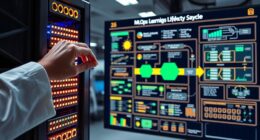To balance breadth and depth in skill acquisition, you should first clarify your goals—whether you want versatility or expertise. Focus on broad learning through courses and experiences for a wider perspective, but also dedicate time to deep practice and mastery of key skills. Continuously evaluate if new knowledge complements your core strengths or causes distraction. Striking the right balance enhances adaptability and mastery; keep exploring how these strategies work together for your growth.
Key Takeaways
- Assess your goals to determine whether to prioritize broad exploration or deep specialization.
- Incorporate cross-disciplinary learning to enhance versatility without neglecting core skills.
- Use targeted practice and advanced projects to deepen expertise in selected areas.
- Balance quick, related exploration with focused effort based on current skill needs.
- Continuously adapt your focus to develop both broad understanding and deep proficiency for long-term success.

Mastering a new skill often involves a delicate balance between exploring a wide range of related topics and delving deeply into specific areas. This balance is essential because it shapes how effectively you develop both versatility and mastery. When you embrace cross-disciplinary learning, you open yourself to a broader perspective, making connections across different fields that can spark innovative ideas and solutions. For example, if you’re learning digital marketing, understanding psychology, design, and data analysis can give you a significant edge. However, without a focus on specialized expertise, your growth might remain superficial, limiting your ability to excel in a particular niche. It’s like having a broad toolkit but not knowing how to use the most important tools effectively.
To progress efficiently, you need to strategically allocate your time and effort. Start by identifying your ultimate goal—whether it’s becoming a well-rounded professional or an expert in a specific area. If your aim is to be versatile, prioritize cross-disciplinary learning. Take courses, read widely, and seek experiences that expose you to different fields. This approach boosts your adaptability and helps you see patterns others might miss. But don’t forget the importance of deepening your knowledge in key areas. Developing specialized expertise requires focused practice, detailed study, and continuous refinement. For example, if you’re aiming to be a data scientist, you might explore multiple programming languages, statistics, and machine learning techniques, but you’ll also need to master a core set of skills through intensive projects and coursework.
Finding the right balance means recognizing when to broaden and when to deepen. As you acquire new knowledge, ask yourself whether it complements your core skills or distracts from your main focus. Sometimes, a quick plunge into related topics can provide valuable insights that reinforce your expertise, whereas other times, it’s more effective to commit to mastering one area before moving on. Remember that cross-disciplinary learning can accelerate your growth by providing fresh perspectives, but without the foundation of specialized expertise, your skills may lack depth and practical value. Additionally, understanding the importance of specialized expertise can help you prioritize areas for focused development, ensuring you build skills that are both broad and deep. Ultimately, your ability to adapt and excel depends on how well you integrate both approaches, continuously shifting focus to meet your evolving goals.
Frequently Asked Questions
How Do I Identify Which Skills Require More Depth?
To identify which skills need more depth, focus on skill prioritization based on your goals. Ask yourself which skills will have the biggest impact on your progress and require advanced mastery. Observe your learning intensity—if you’re struggling to improve or grasp concepts, those skills likely demand deeper focus. Prioritize these areas to maximize your growth, dedicating more time and effort where it counts most.
What Tools Can Help Measure My Progress Effectively?
To measure your progress effectively, you can use self-assessment tools like quizzes, reflective journals, or skill checklists to identify strengths and gaps. Progress tracking methods such as digital apps, habit trackers, or goal-setting journals help you monitor improvements over time. These tools keep you focused, provide measurable benchmarks, and allow you to adjust your learning strategies, ensuring you stay aligned with your skill development objectives.
How Often Should I Revisit and Adjust My Learning Focus?
Think of your learning schedule as a garden; it needs tending and adjusting. You should revisit and adjust your focus shifts every few weeks, based on your progress and changing interests. This keeps your skills growing without becoming stagnant. Regular check-ins allow you to prioritize areas needing more attention and prevent burnout. Stay flexible—your learning journey is a dynamic process, not a fixed path.
Is There an Optimal Ratio Between Breadth and Depth?
You wonder if there’s an ideal ratio between breadth and depth. While it depends on your goals, a good approach is to focus on foundational skills first, then explore advanced topics and interdisciplinary crossovers as your confidence grows. This balance helps you build a solid base before diving deeper. Regularly reassess your progress to guarantee you’re developing both broad knowledge and specialized expertise effectively.
How Can I Balance Skill Development With Practical Application?
Imagine your skills as a garden; practical application waters it, while learning strategies and motivation techniques plant new seeds. To balance development, dedicate time to hands-on projects that reinforce your knowledge. Mix in broad learning to expand horizons, but don’t forget to nurture depth in key areas. Stay motivated by celebrating small wins, ensuring your growth remains steady and vibrant, blooming beautifully through consistent effort and purposeful practice.
Conclusion
So, as you navigate your learning journey, remember that finding the right balance between breadth and depth isn’t just a strategy—it’s a coincidence of curiosity and patience. Sometimes, the skills you stumble upon unexpectedly become your strongest assets. Keep exploring with an open mind, and you’ll discover that the most accidental insights often turn into your greatest strengths. Embrace the surprises along the way; they might just lead you to mastery in ways you never expected.









